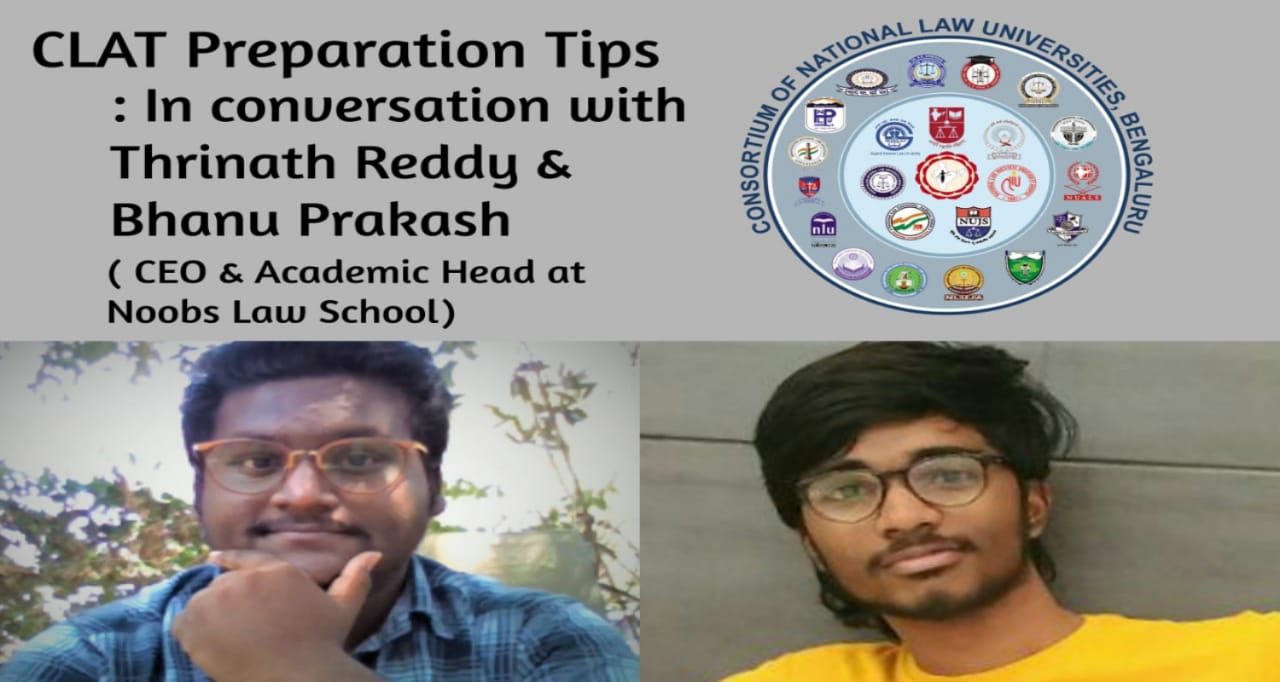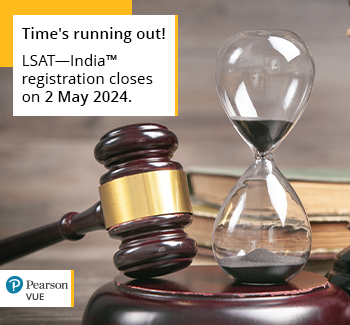CLAT Preparation Tips: In conversation with Thrinath Reddy & Bhanu Prakash – CEO & Academic Head at Noobs Law school

CLAT Preparation Tips: In conversation with Thrinath Reddy & Bhanu Prakash – CEO & Academic Head at Noobs Law school
With almost few months left for CLAT 2021, there are a lot of questions going through the mind of students for CLAT 2021 preparation. To solve some of the important questions through expert opinions, I got a chance to be in conversation with Thrinath Reddy(Co-Founder & CEO at Noobs Law School) & Bhanu Prakash(Co-Founder & Academic Head at Noobs Law School) to solve some of these important questions.
Register for LSAT India June Session - India's Single Entrance Test for more than 50 Private Law Colleges in India including Jindal, NMIMS and more. Apply here
UPES BA/BBA LLB Admissions 2022: Ranked among Top 100 Universities in India by NIRF, Placements in Top Law Firms, International collaborations and more Apply Now
Watch Free Videos, Lectures and solve Questions for CLAT and other Law Entrance Exams on Unacademy, Visit: https://bit.ly/38o11yW Use our code EDUCERE10 and also get free Doubt solving and mentorship from us. For details call 9310486685
Download Past Year Papers of CLAT and other Law Entrance Exams for free: Download Here
Here are the excerpts from the Interview :
Harshita - A lot of Students might start their CLAT Preparation now, although cracking CLAT is quite tough but are there chances that a student starting his/her preparation now can crack the examination? If yes what would be some of the major tips that you would like to give these students?
Thrinath Reddy - Yes, it is possible to crack CLAT if a student starts her preparation now. First of all, the student should go through the entire syllabi and watch all the videos which are available on the official website of CLAT consortium. This will help them formulate their own strategy. After going through the syllabi, one should solve the CLAT 2020 paper and analyse it completely. Solving the 2020 paper will help students not only in understanding the type of question asked but will also help them to identify their strong and weak areas. After solving and analysing the CLAT 2020 paper, students are advised to clear their concepts in English, Logic and Math. It would be an added advantage if students get the basic concepts of Constitution, Contracts, Crimes and Torts cleared. Once the basics of the above mentioned subjects are cleared, one should go with sectional and full length mock tests. This will help students understand their strong and weak areas at a greater depth. This will help them make their weaker sections stronger. Along with this, students should ensure making their stronger sections strongest. If the above mentioned tips are followed by students starting their preparation now, there are high chances of cracking this exam with a very decent rank.
Harshita - Giving enough Mock Tests and good Mock Tests have been a concerning point for a lot of students before giving CLAT. According to you what should be the right approach that a student must follow for giving Mock Tests before CLAT?
Thrinath Reddy - Taking mock tests is really important. But it is just the beginning of the game. Complete and proper analysis of mock tests is mandatory. Students attempting 10 mock tests and analysing them properly are always ahead of students who take 100 mock tests and don’t analyse them. Mock analysis is not just looking at the number of correct and wrong answers. One should find the reason/s for wrong answers and should always correct their answers and should find ways to answer the correct answers more quickly and accurately. Wrong answers might be due to Knowledge gaps, improper revision, not reading the questions/options properly and sometimes marking the wrong options even after knowing the correct answers. Answers answered correctly by the students are sometimes based on flukes and guess work, this also needs to be taken care of. Students need not complete the entire syllabus to write mock tests because the new pattern doesn’t test prior knowledge of candidates, except for a few sections like Current affairs and Quantitative techniques. We get a lot of queries from the students regarding the number of mock tests to be taken before the actual exam. There is no one size fits all answer for this. I know people who got an AIR below 6 with attempting less than 25 mocks and a few who took close to 100 and also got the same level of ranks. I would suggest students to take a mock every week and also a few sectional tests every now and then. Before the actual exam( a month before) one can take 2 per week as well. But mock without proper analysis is equal to not taking mock.
Harshita - Q. Choosing the right Books and Preparation material have always been a concern for many students preparing for CLAT as they don't find enough past CLAT aspirants around them. So, according to you, which are some of the best books for preparation that you recommend for CLAT 2021 for each of the 5 sections and overall preparation?
Bhanu Prakash - Yes, when it comes to our realization on what to prepare and how to prepare for any competitive examination, for that matter, one has to be very choosy and brief about gathering appropriate books and other practice materials for preparation. Moreover, it does not matter how many of them you read or utilize it what it matters is your consistency, adaptability, and most importantly, the surroundings. Ultimately these things will boost and make your preparation, or I will say your situation will thrive at ease and peace. Well, now that's called dead soul's groundwork. For a moment, it sounds crooked, but I don't want to lay it on thick for no reason, and for that matter, no one wants to disturb the dead unless you go crazy. It is also true that there may or will be some inevitable problems, and all you have to do is take time and find solutions, how, you should know. Furthermore, after considering all of this, one has to be aware and avail an important thing, i.e., TIME. And these books and online sources will make the grade and boost your preparation along with daily practice for self-study; this also suits you if you are already enrolled in any couching for which you will already have study materials as reference and work practice.
CURRENT AFFAIRS, INCLUDING GK
1. The best source for this section is the newspaper. What kind of preparation it is for current affairs devoid of newspaper reading. Pick up any one standard newspaper like the Hindu, Indian Express, Times of India, etc. Additionally, you can also follow monthly magazines like Pratiyogita Darpan, Frontline, EPW, etc., only if you are comfortable with it.
2. Online sources like GK Today, Jagranjosh, Affairscloud..etc., are the most reliable online websites that equip enough information for current affairs and GK's daily preparation. Additionally, other websites like Drishti IAS, Insights India, Scroll.in, The Wire will boost up the practice if given and applied proper time for each of these. One should also remember that necessarily you don't have to go through each and every news of the day and in that it counters our understanding of reading things in detail when you should have equipped proper strategy for whatever you go through that must be important keeping in mind CLAT 2021.
3. The same thing applied for the GK section, and it should be a part of your daily reading as background facts for any significant issues of current happenings, and when it comes to the static part, do not forget our dear lucent. Yes, Lucent's GK is all you need, and that will suffice.
ENGLISH LANGUAGE
1. For the English section, all you need to do is comprehensive reading along with grammar and vocabulary, be it extensive when you have time or intensive reading, of novels, fiction, or non-fiction books of multiple genres. Wren and martin's grammar is quite helpful for you to understand basic grammar in this regard, and when it comes to vocabulary, there Norman lewis's 'Word power made easy' it does more than than just add words to your vocab list and '30 Days to a more powerful vocabulary' also includes etymology. Furthermore, it should be a part of your daily preparation by maintaining a register of words, at least 5-7 words every day.
LEGAL REASONING
1. There are two essential aspects to this, legal knowledge and reasoning. The former requires you to be aware of contemporary legal and moral issues and identify legal principles and rules that go hand in hand with your current affairs preparation. And in this regard, following daily legal issues from newspapers and other standard sources is crucial. For reasoning, AP Bharadwaj's 'LA. LR', for understanding basic concepts will be a good read.
LOGICAL REASONING
1. This is the section where you encounter critical reading and understanding; basically, it is critical reasoning. You can refer to R.S Agarwal's 'A modern approach to logical reasoning,' providing basic practice questions, and MK Panday's 'Analytical reasoning,' providing you with a basic understanding of essential concepts and practice sessions. Then you can go for GMAT learning and practice critical reasoning passages.
QUANTITATIVE TECHNIQUES
- And finally, the least considered most crucial section - Quantitative techniques. This section requires an understanding of class 10 level elementary mathematics, and in this regard, R.S. Agarwal's 'Quantitative Aptitude' and Rajesh Varma's 'Fast track arithmetic' will provide practice questions and understanding of basic concepts. Moreover, do not forget to access the website and PDFs (which are primarily free for additional practice) for Data Interpretation and other essential concepts. Therefore, gathering these sources is only one part of the job; for it to be fruitful, you must devise an appropriate structure to strengthen your daily preparation. To put it simply, the body's bones give you a structure, and for it to function its metabolism, the organs will do the rest per se, lying underneath a network of imagination that is restless. The preparation is all about balancing stuff and attention to details as the famous saying goes, 'the devil is in the details,'and when you are reading anything, you shouldn't just read, but read between the lines.
Harshita - As we are all aware that Medical & Engineering aspirants start preparing for their exams from class 11th or just after giving their 10th Board examination, so, according to you, what will be the best time for the student to dedicate himself to start preparing for CLAT & examination.
Bhanu Prakash - I will take the liberty of saying that any time before the day of the examination or even before a minute of the exam is perfectly fine, but then it is too vague and exaggerated. One important question arises as to when and how to put everything in place before our reflexes start to think confidently on succeeding further besides not getting into any of the NLUs despite all the efforts you put into and in that sense also one requires to maintain balance. Furthermore, if anyone starts preparing after the 10th, he/she has got plenty of time to gather sources and structure a proper plan for the same. They've got two years of time to settle down and make the best out of it if spent appropriately. And an early preparation also saves you from distressful situations like managing both the Clat and boards and in that case they've got prior experience, time to practice, to watch TV series and movies and also a sense of management making the whole preparation a rollercoaster ride. So, preparing for any competitive examination, for that matter, an early catch-up, will definitely make you feel stronger, confident, and lazy at certain times. So, is it all about time and management? The answer is both yes and no. It is yes when you are diligent and determined in what you chase for, and it is no when you're just preparing for the sake of preparation. If anyone asks you, what is your aim? Then what answer will you give them? Will it be about becoming a lawyer, or will it be about which NLU you desired for. So isn't just wishing to become a lawyer bit vague as in a distant memory that crawls all over the spine. Then the immediate aim for you should definitely be about not just preparing for Clat and other law entrances but also acquiring those skills that define you, and it only happens when you avail time for it and strive for what you desire. The best time to dedicate yourself is when you give yourself to surrendering to CLAT, a time you feel is the right time, and rest assured. There is a thin line between when you realize the moment you decided to attempt Clat and the moment you started loving it, then shouldn't you be giving ample time to get into an NLU, and when you do that, all you need is a proper course to channelize that desire.
Harshita - CLAT examination consists of 5 different sections each & every section having their own importance and without doing well in all of them, a student cannot clear the examination well. There are even sections like Legal Aptitude/ Reasoning and Logical Reasoning which are not there in the student's school curriculum. So, according to you, what could be a specific preparation strategy for each of the five sections? Kindly put some light on the same so that it can benefit the students a lot from your vast experience.
Bhanu Prakash - ENGLISH LANGUAGE SECTION
The English language is one of the crucial sections that will test your reading ability and comprehension along with a command over grammar and vocabulary. The three main components in this regard will be Reading comprehension passages, grammar, and most importantly, vocabulary. Preparation of all these components must go hand in hand while also practicing them at the right time. Let me give you some additional supplies to this section compensating your demand for a holistic preparation. Now for that to happen, you must pick up relevant portions of Clat preparation of all sections like reading newspaper editorials and opinions thoroughly trying to analyze comments and new words while adding them to your vocab list, practicing similar questions in the critical reasoning section while also understanding basic models and methods interpret to a passage is crucial. Interpretation is the need of the hour, and you must ponder for a while until you are clear with the concepts. And apart from this, preparing essential grammar topics along with minimal (but intensive) practice will suffice the rest, at least 30 minutes a day until you've understood the basics and their application in R.Cs.When it comes to vocabulary, without it, your preparation for the English section is doomed. If you misunderstood one single word, then your interpretation of the passage is lost in crowd. Always remember vocabulary should not be forgotten even a single day; add, learn and revise them twice or thrice a day. So, keep on adding at least 5-7 words, and whenever you get free time, push them in your beautiful mind. Moreover, denoting not more than 90 minutes daily will drive you further, so learn, add and practice.
CURRENT AFFAIRS, INCLUDING GENERAL KNOWLEDGE
Current affairs, a section that requires extensive reading of topics and issues daily, touted as one of the most straightforward sections but not always; sometimes, it will be a cakewalk if you follow it every single day. Consistency is what this section demands the most. You can make the most out of it, provided you read and analyze any one standard newspaper of your choice that should not exceed 60 minutes of reading, specifically focusing on editorials and essential articles. And when it comes to note-making, there is a need of making notes mainly from online sources like GK Today, Affairscloud, Jagranjosh, etc., but not from newspapers, because most of the issues reflect in online sources in a simple format, also giving you the background facts of the issues that is a part of G.K. for which spending 50-60 minutes is more than enough. Furthermore, as you proceed with doing this every day, you tend to recollect all the important issues and facts as you will revise them daily, weekly, and monthly.Moreover, it is up to you whether you want to follow monthly magazines of your choice, and in this way, it will boost your memory and reading speed. While attempting this section in the examination, you will be familiar with every passage that you hover on and complete the section within 15 minutes of time, maintaining speed and accuracy. Finally, the most crucial aspect of this section is reading a newspaper, the savior.
LEGAL REASONING
There are two essential aspects to this, legal knowledge and reasoning. The former requires you to be aware of contemporary legal and moral issues and identify legal principles and rules that go hand in hand with your current affairs preparation. And in this regard, following daily legal issues from newspapers and other standard sources is crucial. For reasoning, A.P.Bharadwaj's 'L.A. L.R.', for understanding basic concepts will be a good read. Moreover, even if the Clat pattern is changed, that does not mean you mustn't be aware of the basics of what was previously there, and it will still be intact in the current preparation. In this regard, you must practice principle-fact-based questions, read legal G.K, and most importantly, distinguishing legal issues from newspapers and your current affairs preparation. This section is a bit lengthy and time-consuming, but you can tackle this situation by practicing these passages with utmost care and attention. Out of 35-39 questions that roughly constitute 25% of the paper, be sure that you at least attempt 25-30 questions accurately with speed. This section can be a cakewalk if you really understand and cooperate with what society does to the question paper. Finally, just don't lose the attention for this section because it requires you not just to be knowledgeable but to analyze and comprehend a bunch of words.
LOGICAL REASONING
This is the section where you encounter critical reading and understanding; basically, it is critical reasoning. You can refer to R.S Agarwal's 'A modern approach to logical reasoning,' providing basic practice questions, and M.K. Panday's 'Analytical reasoning,' providing you with a basic understanding of essential concepts and practice sessions. Then you can go for GMAT learning and practice critical reasoning passages. This section again is some time-consuming and will require absolute attention towards understanding basics. You should consider one important thing about this section's very nature, that is, looking for logical methods set out in the passage. Daily practice for at least 60-80 minutes, and later on, you can also start practicing the GMAT questions. Moreover, list out the topics of analytical reasoning that is bothering you, then set a timer and do not relax until you’ve understood. Finally, be prepared with the basics as you will encounter such a question where simply guessing is not enough because you need to be accurate and remember negative marking.
QUANTITATIVE TECHNIQUES
All the good and evil lies in the name and nature of the section itself, "Techniques," but quantitatively. In this regard, does it matter how you perceive this section to be, whether it brought you cheers or nightmares? So be it, all you need to do is put on a happy face and once again try to understand what it can do to your preparation if you had given ample time and practice for the same. As the famous saying goes, 'man does not live by bread alone,' then you must never ostracize any section, be it maths or reasoning. Remember to pick up a standard book and online for your practice and references like R.S. Agarwal's Q.T. or Rajesh Varma's 'Fast track arithmetic,' and other books which you find helpful but only after you understand each topic specifically looking for standard techniques and application will save you from sinking. Now, it's not just about the books but also how much time you devote to each section based on your comfortability. Tackle those topics of Q.T. which poke and scratch you. Try to understand these topics separately and practice at least 50-100 questions and models in this regard, and at the same time practice to make yourself aware of Data interpretation (again interpretation, the need of the hour) and such other topics. So, you are preparing individual topics of Q.T. and applying these in the Data interpretation passages. Furthermore, analyzing 5-10 DI passages daily along with the primary practice of Q.T. topics will not let you down. So again, quantitatively, you should devise how much time you will invest in stabilizing your stock of preparation.
About Author
Harshita Nandal
Harshita Nandal has worked as a Creative head in Mitrakshar, University of Delhi. She has done her Graduation from the University of Delhi in English Honours. In her free time, she prefers to play the guitar, take short walks in between work and loves to watch Korean dramas. Currently, she is an author at Educere India to fulfil the desire of her passion for writing.







